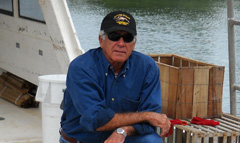Last week’s FWC meeting dealt with several issues of importance to Keys fishermen. Artificial habitats, or casitas, were finally rejected after several years of hearings, studies, and political posturing. The plan should have been rejected the day it was proposed.
Proponents fantasized that at the same time the FWC was actively restricting the lobster industry with trap reductions and quotas, they were somehow going to open an entire new industry to harvest lobster. In the process, they trashed all of their friends and fellow fishermen, by arguing that traps were somehow harmful to the environment, while their casitas would be a ‘green fishery’.
From a more practical standpoint, it recently took me 6 ½ years to obtain permits for docks, seawalls, and maintenance dredging on my own property. It staggers the mind to think of obtaining all of the permits necessary to place miscellaneous junk in the Florida Keys National Marine Sanctuary.
To fill the bureaucratic hole left from no casita hearings, the FWC decided to plug in bully netting. After creating a lobster fishery that is virtually inaccessible to new entrants, many young people have turned to bully netting as one of the last ways to supplement their dwindling income. Bully netting is a niche fishery in which a small amount of profit may be made in August and September, if the moon, tide, wind, and season are just right.
Nevertheless, regulators now have their eye on it as a harvest method that has slipped through a regulatory crack. They estimate it now accounts for 4% of the total catch, so they need to act quickly before it jumps to 5% or even 6%. This potential threat will be good for a new round of studies and hearings, before they predictably place strict limits on the number and transfer of licenses. Bully netting is another tempest in a teapot, but that’s what bureaucracies thrive on.
Speaking of wasted time, why is any government agency even spending one minute of taxpayer time with lionfish. The damage is already done. Lionfish have proliferated from the Carolinas to the Bahamas and Gulf of Mexico, and nothing anyone can do will now eliminate the species. Making lionfish legal for everyone to harvest in any amount, is simply all that can be done.
But no! There’s a treasure-trove here for environmental peacockery. So we come up with such foolishness as a ‘smartphone app that allows users to report lionfish sightings, log catches, and interact with maps of artificial reefs where the species have been reported’. “It’s like Ebola, and we’re searching for the silver bullet,” said FWC chairman Richard Corbett… As they say, you can’t make this stuff up.
I will say there is a bit of irony here. The same scientists and environmental alarmists who spend their days sounding the warning about commercial fishermen wiping out different species by overfishing, can’t figure out a way to wipe out a single species of fish when they actually try.
We also see from the hearings that crocodiles have now joined wolves, grizzly bears and mountain lions, as dangerous predators that have now been reintroduced to human populated areas. The enactment of the Endangered Species Act is a classic example of ‘no good deed goes unpunished’. What a bonanza the ESA has been for bureaucracies and the trillion dollar environmental industry.









